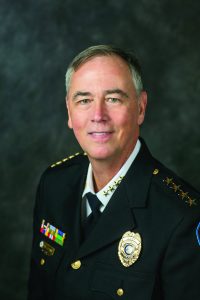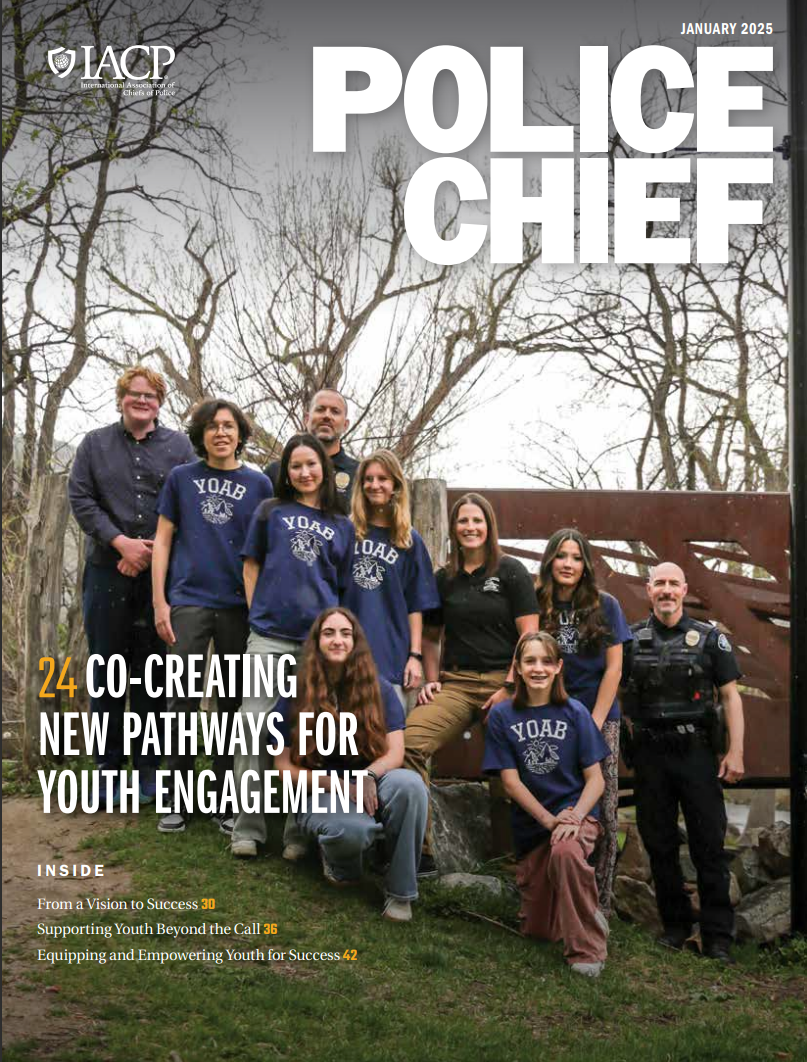
Chief of Police
Thomasville Police Department, Georgia
As I begin my term as the 2022–2023 IACP president, I wish to thank the IACP staff, board members, and Immediate Past President Dwight Henninger for their service and work to move the association forward. As our members know, there were many accomplishments during the past year; among these, initiating the IACP Trust Building Campaign is one of the most significant.
The issue of trust in policing is not new, nor is it limited to the United States. As I have traveled to other countries and met with global police leaders, I have learned that, to a large extent, we are all dealing with similar issues and have similar opportunities, and the issue of communities having trust in their police agency is a global one that dates back to the origins of modern-day policing.
In fact, the foundational principles of the police service as espoused by Sir Robert Peel, the British Home Secretary in the mid-1800s who is considered the father of modern-day policing, include elements of trust and legitimacy. In some measure, all of his nine policing principles can be tied in some way to trust and legitimacy.
To that end, your Executive Board is making arrangements to hold the annual strategic planning meeting in the UK, not only to get back to our “roots” in policing, but also to enhance the Trust Building Campaign in ways that have historically been effective.
The overall concepts of trust building and partnering for public safety have been incorporated in a variety of ways over time—most recently, through National Faith and Blue Weekend. Launched to facilitate safer, stronger, and more unified communities, Faith and Blue has seen hundreds of law enforcement partners and their communities come together to collaborate and engage. Building trust, as well as enhancing it in so many of our communities where the community already has a positive and trusting relationship with their police, is a constant need that transcends time, geography, and politics. It is important because law enforcement exists to serve the public by being an integral part of the community and by forging relationships to enhance its ability to solve problems. No community can function effectively without law enforcement, and no law enforcement agency can function effectively without the community it serves.
But it’s not just the police that need to build trust. There needs to be transparency and responsiveness across the criminal justice system. As retired chief, IACP Board of Directors member, and my friend Todd Axtell says, “The spokes of the Criminal Justice System wheel must work in concert (police, prosecutor, courts, judges, etc.), and the hub is victim centered.”
To that end, I will task our committees, sections, and staff to identify opportunities to engage our system partners and advance the conversation with a goal of collective agreement on systemic improvement that will have a positive impact on public safety and enhance trust in our communities, certainly with a victim-centered perspective.
Additionally, we know that conversations about police reform must include the police perspective. Through the advocacy weight of the IACP and the bipartisan relationships we have built, we have a seat at the table when these important topics are discussed—and our perspectives are considered at the highest levels of government. This is important because being part of the conversation affords us the opportunity to clarify the narrative and include a factual representation of the issues and perceived problems, which puts them into proper perspective.
Governor Brian Kemp of Georgia captured the importance of recognizing this when he said, “While so much of our attention is on the few that have violated their oath, we have failed to express our deepest appreciation for the many more who uphold it every day.”
We know that the vast majority of police officers are professional public servants who sacrifice of themselves to make a difference in their communities. The IACP will continue to highlight this and use its voice to combat the negative narrative with facts about the nobility of our profession.
To inform that voice, we will bring back the IACP Listening Sessions first conducted several years ago under the leadership of Past President Terry Cunningham.1 We learned through those interactions that, by meeting with our members in smaller sessions, we gain keen insight about the issues you face, locally, regionally, and beyond.
In developing the Trust Building Campaign, which was launched just a few months ago, the Executive Board and specifically the vice presidents who would move through the chairs to assume the presidency, all agreed to support a long-term focus on this important topic.
While each president has his or her own priorities for his or her term, we agreed to a collective focus that would hopefully imbed the campaign into the fabric of the IACP and our profession, ensuring continued progress and, where needed, improvement.
As we considered this, it became clear to me that we should rethink the hand-off from one IACP president to the next. While effective in many ways, the start and stop of the presidential year needed to be revisited. Our world, along with our profession, has changed and we believe we will be most effective going forward by developing a multiyear focus.
We will certainly continue to have our goals, but they are particularly focused around the Trust Building Campaign and the perennial needs and opportunities where the association could, and should, expend its time and talent. The perspective that came to me was that we should have a mindset similar to that of a relay race participant. Each of us has a time to hold the baton and lead the charge. But, there comes a time to pass it off, once the next in line gets up to speed. This ensures a smooth transition and a continuing of the important efforts of the IACP from one year to the next.
The “I” in IACP
Keeping the “I” in IACP has been a focus for quite some time, and we have made great strides. Our international vice presidents, as well as our Global Policing director and staff and others, have done exemplary work in this area and have helped position us to be more involved in global policing opportunities.
“Our partners across the profession must come together to make a positive difference.”
However, as we all know, the pandemic had a profound effect across the world, and from the IACP perspective, we missed opportunities to continue our global outreach, attract new members, and develop new relationships.
As the effects of the pandemic continue to subside, and hopefully remain manageable, we will continue to work with our colleagues at Interpol, Aseanapol, Europol, Ameripol, and others as we seek new partnerships with aligned organizations and associations. For the first time in many years, our World Regional Chair positions are all filled, and these representatives have joined the Board of Directors, bringing their perspectives and expertise to the membership. In addition to our office in the United Arab Emirates, we now have an IACP office in South Korea, and we are looking for additional opportunities to extend our reach by opening offices in other countries.
As I have met with police leaders and attended meetings of these associations, several common themes arise. From cybersecurity to drugs and gun violence to human trafficking, we have more in common with our global counterparts than many may realize. The IACP will continue to focus on these topics to enhance collaborative opportunities where we can connect our expertise to agencies in need, increasing our global impact.
A wise emergency manager once told me many years ago that “All disasters are local.” Similarly, transnational crime, homeland security concerns, and even multinational human trafficking are “local.” Either at the point of origin or point of execution, or somewhere in between, the local police must address the issue, and many are just not equipped to do so. That is why our partners across the profession must come together to lend their abilities and resources to make a positive difference in these and so many other areas.
Global Traffic Safety
Enhancing traffic safety by reducing impaired driving and other causes of serious injuries and deaths is an important focus of the association and part of the mission of many of our committees and sections. In support of global road safety, IACP’s recently signed memorandum of understanding with ROADPOL will become operational, and we will continue our work with the International Road Policing Alliance, Bloomberg Philanthropies, and the World Health Organization, who recently reported that approximately 1.3 million people die annually on our roadways.2
Our efforts at global road safety must expand, so that IACP and our partners can continue to save lives and make our roadways safer. We will continue our work with the U.S. Department of Transportation on Traffic Incident Management to reduce secondary crashes and responder struck-by incidents, a key component of officer and responder safety, and we’ll attempt to expand that concept beyond U.S. borders.
Shaping the Future of Policing
We will continue to enhance our signature programs, including the Mass Violence Advisory Initiative, Elevate Blue, IACPlearn, and others, and maintain a continued focus on the important work of the National Consortium on Preventing Law Enforcement Suicide. From the perspective of leadership, and the responsibility we all have to prepare the next generation, IACP is a ready resource to help with your succession plan.
It is a responsibility of every police leader to invest in the next generation, a concept integral to IACP’s mission of “shaping the future of the police profession.” That is why I am excited to see the progress of the Smaller Department Section and the Division of State Associations of Chiefs of Police (SACOP) in redeveloping and advancing the Mentor Match program. I encourage you to take advantage of the program to help train your leaders of tomorrow and to serve as a mentor to help others do the same.
You see, it’s not only what you get from IACP, it’s what you give. To that end, there are many opportunities to become more involved. Please consider serving on a committee, seeking a position on the Board of Directors, or running for one of the elected Executive Board positions. We need your perspective, your talent, and your vision.
In closing, it’s an honor to be your president, but more so, it’s an honor to be a police officer in service to an agency and a community. Because what our profession stands for, the nobility of what you and I do as police leaders and police officers, matters. It matters to our agency, our communities, our profession, and our nations.
I am excited about this next year, working with our more than 32,000 members in 170 countries and our staff to make a difference in public safety around the globe as, together, we shape the future of the policing profession. d
Notes:
1IACP, Trust Initiative Report (Alexandria, VA: IACP, 2018).
2World Health Organization, “Road Traffic Injuries,” fact sheet, June 20, 2022.
Please cite as
John Letteney, “The Year Ahead: 2022–2023,” President’s Message, Police Chief 89, no. 11 (2022): 6–8.


